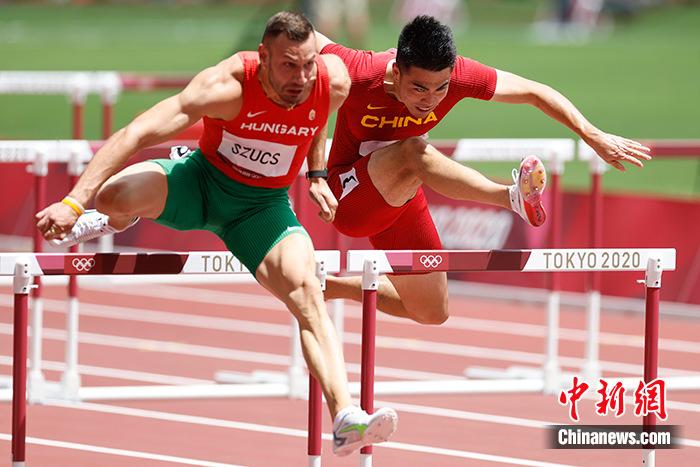(Tokyo Olympics) Xie Wenjun missed the 110-meter hurdle final: I still have dreams
China News Service, Tokyo, August 4th. Title: Xie Wenjun missed the final in the 110-meter hurdles: I still have dreams
China News Agency reporter Xing Chong
At 13:58, the Chinese short-span star Xie Wenjun, who participated in the Olympics for the third time, still failed to go further.
His dream has always been to enter the men's 110-meter hurdles final of the Olympic Games, but in Tokyo on the 4th, this dream still failed to come true.
In fact, he has this strength, and he can even hit medals.
At the Doha World Championships in 2019, Xie Wenjun made his way out of the "Death Group" in the semi-finals and entered the final with 13.22 seconds. Only 3 hours later, he ran at 13.29 seconds in the final and finished fourth. This is after Liu Xiang Chinese athletes have achieved the best results in the men's 110-meter hurdles.
On August 4, local time, Chinese athlete Xie Wenjun (right) in the men's 110-meter hurdles semifinal.
On the same day, the men's 110-meter hurdles semifinals of the Tokyo Olympics were held at the New National Stadium in Tokyo. Chinese player Xie Wenjun missed the final with a score of 13.58.
Photo by China News Agency reporter Tomita
Because of Liu Xiang, the men's 110-meter hurdle has become a track and field event of great concern to the Chinese people.
In the 2004 Athens Olympics, Liu Xiang successfully climbed to the top and became the first men's Olympic champion in track and field in China. His Olympic record has been maintained to this day.
After Liu Xiang retired, Xie Wenjun, who studied under the same school, was always known as the "successor of Liu Xiang". He also proved the strength of the new generation of "Asian champions" with his achievements in the National Games, the Asian Games, and the fourth in the World Championships. .
It's just that in the Olympics, Xie Wenjun, who "betted everything", still failed to realize his "dream in his heart."
At the 2012 London Olympics, the 22-year-old Xie Wenjun ran in 13.34 seconds in the semifinals to refresh his personal best, but finally ranked 9th and missed the final; four years later in Rio, there was a sudden heavy rain on the day of the preliminaries, and Xie Wenjun only ran in 13.69 seconds. Ranked 25th, after failing to make the semi-finals, his face was full of disappointment, and he said bluntly that he "can't figure it out."
But this time, it was because of injuries that blocked him from the finals.
The sudden new crown pneumonia epidemic disrupted Xie Wenjun's training rhythm.
After returning to China last year, Xie Wenjun wanted to improve the weak links in the starting technology, and followed the foreign teacher Randy who instructed Su Bingtian to make technical adjustments. He had already gained obvious gains, but the injuries appeared so "untimely".
It turned out that Xie Wenjun had a severe strain on his left leg, and the improvement in starting technique caused him to increase the load on the tendon of his left leg, which eventually led to inflammation of the tendon.
To be on the safe side, he could only change back to the less risky "eight steps up the hurdle", and then missed many games. The best result of the season before the Olympics was only 13.49 seconds.
Xie Wenjun said that in his short career for more than ten years, he has been chasing the light of brother Liu Xiang.
"In Tokyo, it may be the last and best opportunity to pay tribute to the seniors." In order to increase the 0.1 second, Xie Wenjun bet everything-whether it was the "eight to seven" steps in the hurdle, optimizing the hurdle movement, or following Lan Di improved his starting technique and changed back to eight moves after being injured, all of which were "gambling" again and again.
"I don't regret it. On the contrary, if I don't take a fight, I will regret it!" said Xie Wenjun after missing the finals.
This year Xie Wenjun is 31 years old. Will he stick to the Paris Olympics three years later?
"The impact of injury is too great, I still have dreams." He replied.
However, for the Chinese men's short-span project, the more serious question is, after Xie Wenjun, who can carry the banner and become the next successor?
At present, only Zeng Jianhang can run to 13.50 seconds in China. He has trained with Liu Xiang and Xie Wenjun's teacher Sun Haiping, but his results have been fluctuating.
Although the 22-year-old was also qualified for the Tokyo Olympics, he failed to make the trip due to an accidental fracture during the first half of the game.
In contrast to Japan, taking advantage of the opportunity of hosting the Olympic Games, the Japanese men's short-straddle event has made significant progress.
The 25-year-old Kanai Dawang ran at 13.16 seconds this year, and the newcomer Izutani Junsuke, who was born in 2000, won the championship at 13.06 seconds in the domestic trials.
The two also entered the semifinals of the Olympic Games. Izumiya Junsuke and Xie Wenjun ran in the same group at 13.35 seconds and failed to qualify by one; Jinjing Dawang accidentally fell and failed to enter the finals.
Chinese players have achieved nine consecutive championships in the men's 110-meter hurdles in the Asian Games. The most realistic question at the moment is, can the Chinese team continue its glory in the Asian Games to be held in Hangzhou next year?
Who can realize the unfinished dream for Xie Wenjun?
(Finish)

